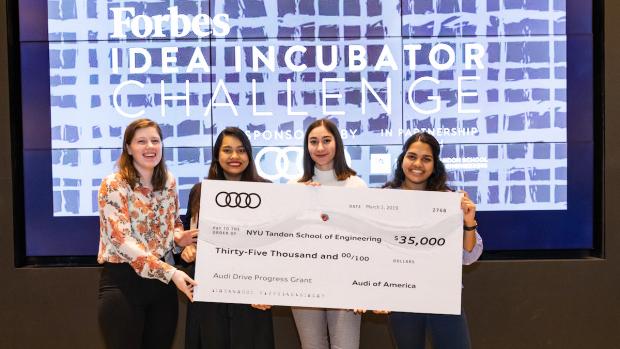Innovators with drive
Developing the future of transportation at the Forbes Idea Incubator challenge

Grand prize winners of the Forbes Idea Incubator challenge
The automotive company Audi has become known in recent years for encouraging young women to enter the STEM fields, and in early March, in partnership with NYU Tandon, they sponsored an exciting challenge at the school. During the event, which was presented by Forbes, Tandon’s female students were asked to develop potential ways to address the impact that electric vehicles and related infrastructure will have on urban mobility.
An extension of Audi’s sponsorship of the 2018 Forbes Women’s Summit that was held June 18-19 in New York City, the Forbes Idea Incubator served as a platform to present the generous Audi #DriveProgress Grant of $50,000, used at Tandon to provide financial assistance for student tuition and related expenses.
“Today’s female STEM students will unleash on the world new ideas and unimaginable innovation that will move our world forward,” said Mark Del Rosso, the president of Audi of America. “Audi is honored to collaborate with Forbes and NYU Tandon as part of our commitment to drive progress for this generation and those to come.”
Some two-dozen aspiring female engineers did, as Del Rosso predicted, unleash several new and innovative ideas at the event, which culminated with teams pitching to a panel of judges that included Professor of Civil and Urban Engineering Joseph Chow, who also serves the Deputy Director of Tandon’s University Transportation Center C2SMART; Sarah Kaufman, the Associate Director of the NYU Rudin Center for Transportation and an Adjunct Assistant Professor of Urban Planning at NYU Wagner; and Steven Kuyan, Managing Director of the NYU Tandon Future Labs. (Dean Jelena Kovačević was also in attendance to cheer on the contestants.)
The grand-prize winners were Tasmia Anika, Aida Mehovič, Nicole Lyons, and Vidya Gopalakrishna, who teamed up to envision an integrated hardware and software system that splits power distribution at charging stations. They dubbed their idea 2Point and explained: “Our team identified a chicken and egg problem with EV's and charging stations. Which comes first — the EV or the charging stations? Consumers want to purchase electric vehicles but they're hesitant to do so because the infrastructure for charging stations has not been as fully developed as the traditional gas station. State and local governments want to invest in the infrastructure for EV stations but want to see greater demand from consumers first.” They continued, “We've devised an additive solution; a hardware tool that connects to the plugs on existing charging stations so that power distribution can be tracked and split in half, allowing two EV's to charge simultaneously. Since the power distribution is being tracked through our two point system, the device deduces the energy consumption of the station it's connected to and feeds that data to a user interface that city planners can view. With this data, city planners are able to determine which stations have high or low traffic and prioritize development of infrastructure based on the demand or lack thereof.”
They impressed judges with their detailed plan and clarity, making a convincing case for their technology. “Given that one of our criteria was the feasibility of the solution, they really excelled in that category,” Chow asserted, while Kuyan said of their presentation, “They were able to bring the concept to life, and I can’t wait to see them to prototype it!”
The second-place prize was awarded to Jillian Larson, Nicola Ramdass, and Bryanna Simone Allen for an app they called cityCharge. “We anticipate charging stations being implemented in cities using the existing power infrastructure from street lights and regulated like metered parking,” they explained. “Our app will allow users to view the real-time status of these stations and could be integrated into a car’s dashboard and supported by Amazon Alexa.”
Kuyan praised the team’s combination of “ambition and engineering to showcase how currently available infrastructure can be leveraged to support the growing need to charge electric cars in cities with a fairly straightforward retrofit,” while Chow lauded their “well-researched presentation, clear vision, discussion of policy implications, and innovative thinking.”
The Challenge was deemed an unqualified success. “We are very grateful to Forbes and Audi for giving our students the chance to participate in a fun and thought-provoking day,” said Assistant Dean for Opportunity Programs Nicole L. Johnson, who helped organize the event. “All of the student teams did a wonderful job and they stand as shining examples of Tandon collaboration, ingenuity and creativity.”




